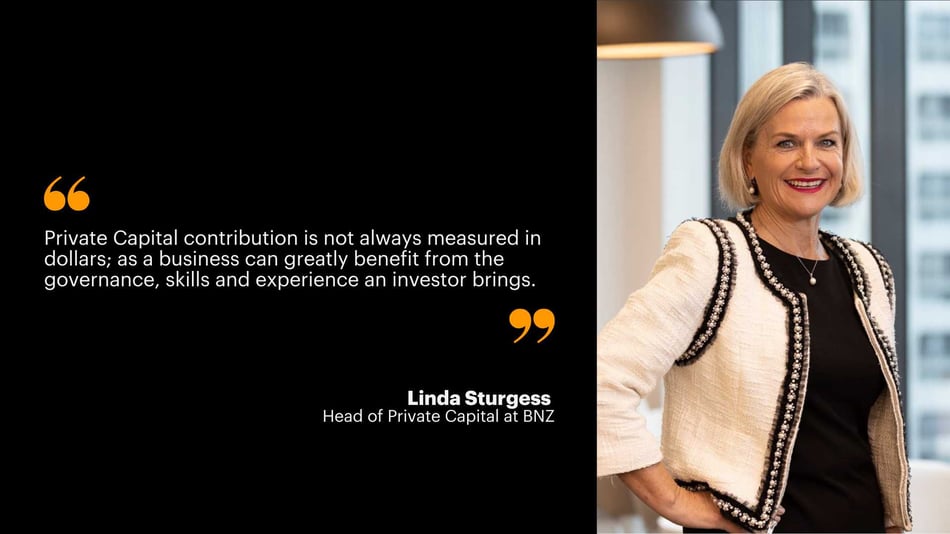What you need to know about Private Capital investment

Private Capital investment is one of the most effective ways businesses can facilitate growth. However, it’s important to know the basics and how to get in the best possible shape to attract investors. The Icehouse caught up with Linda Sturgess, Head of Private Capital at BNZ, a partner of The Icehouse, to find out more.
.jpg?width=1920&height=1081&name=BNZ%20and%20The%20Icehouse%20Private%20Capital%20Investment_%20Blog_Image%20(2).jpg)
Is there ever a ‘right time’ to consider seeking Private Capital investment?
While there’s no one-size-fits-all answer, a business which is about to go through significant step-change growth is a common period when considering private capital. It’s often event driven; the business may have been along a start-up route and got to a point where turnover has reached a certain level – to continue to grow, businesses need to put in the actual building blocks for the next critical phase.
International expansion is also a common consideration period – whereby a business has tested their product and wants to build their presence in a new market, but it’s going to cost a significant amount of money and needs more capital to fund that expansion.
What does a business owner need to take into consideration when looking for external capital?
Investors will conduct their own due diligence on the business to ensure it’s a sound investment. So, business owners need to be ‘match-fit’. This means having strong accounting practices so the financials can be relied on. Ideally, business owners will have audited accounts (although this can depend on whether the investor requires this), projections, and forecasts.
Forecasting is important as it can demonstrate the performance of the business in different economic conditions. If things are going to be tough over the next 18 months, for example, businesses need to make sure their financials reflect the scenarios that could play out.
A key recommendation is to consult with trusted advisors and consider locking up any Intellectual Property. I'd recommend seeking specialist legal advice on protecting the business’ “gold”. It’s important to have reviewed any contracts with key suppliers and customers to ensure the business has clarity on the most important relationships. It’s about making sure the business is in a position to receive capital. Engage with a banker about the business plans and I can look to introduce you to potential investors.
What mistakes can an owner make in the process?
It’s incredibly important that both parties go in with their eyes wide open. Mistakes can occur when expectations of the investor and vice versa are not clearly communicated from the beginning.
The top three common mistakes I see are:
- Failing to prepare a compelling pitch. Business owners should prepare a pitch that clearly communicates the value proposition of their business, including the problem it solves, the size of the market, and the competitive landscape. A poorly crafted pitch can turn off potential investors and make it difficult to secure the funding needed.
- Failing to have a solid business plan. A strong business plan is essential for securing private capital. This should include a well-defined strategy, realistic financial projections, and a clear plan for scaling the business.
- Not having the right team in place. Investors want to see that business owners have a strong team in place to execute their business plan. This includes having key hires and a solid leadership structure.
It’s about being disciplined and clearly articulating future plans for the business and what the business will do with the capital.
It’s important to remember different investors may have different goals, timelines, and expectations for the business. Consider whether the investor aligns with the business's long-term goals. Investors may be more likely to invest in certain stages of a business life cycle too.
For example, an owner may want an investor who has experience of taking the business through to an initial public offering (IPO). So, the more information we have about where businesses want to go and what they're trying to achieve, it'll make it easier to find a good match for.
Why is smart capital growth important?
Not all dollars are the same. A business might want capital, but they also might want skills, experience, and networks, which adds value to a business through more than just the cash an investor puts in.
The investor needs to be patient. In asset allocation, business ownership is considered an alternative investment which have a long-term investment timeframe and higher risk is accepted in pursuit of potential higher returns. It’s another reason why owners need to make sure they’re in business with the right investors.
What is your role in the process?
One of our primary goals in the BNZ Growth Sectors is growing New Zealand’s prosperity by growing New Zealand businesses and their people.
This helps to accelerate the New Zealand economy. The way we do that is by supporting businesses we bank, so when they are ready to accelerate with step change growth, we can help them connect with accountants, lawyers, and capital structuring firms that specialise in preparing the business to receive capital.
When they're ready, I can make the introductions to potential investors which include Family Offices, Private Equity, Venture Capital firms, or Angel Investors depending on what stage they are at.
We know as businesses grow, their facilities grow alongside them. My role within BNZ and Private Capital is keeping growth-oriented businesses here in New Zealand by helping them find the right partner with capital to enable their growth ambitions so that NZ retains IP, talent, and skills.
What are you predicting for the next 18 months?
In challenging times, I see opportunities. New Zealand businesses have a great reputation for innovation, so I'm excited to see how the businesses make the most of the current environment.
The way I can help is by taking them from being a small business that’s constrained by capital to one that has well-matched capital that can help them accelerate their growth ambitions.
Banks are in a really good position because we get to see a big cross section of the New Zealand economy, and we can help with connections and partner with them for the long haul.
This article is solely for information purposes. It’s not financial or other professional advice. For help, please contact BNZ or your professional adviser.
For information on programmes, workshops and business coaching services from The Icehouse, click here.
For more business ownership and leadership advice, check out more of our resources.
Icehouse Alumni? For exclusive content on Icehouse Central, register now.


